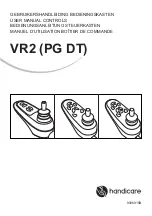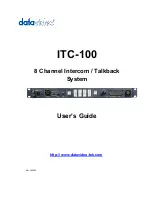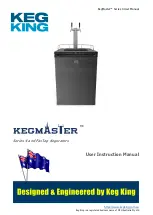
7
The following safety precautions should be observed before using this product and any associated instrumentation. Although some instru-
ments and accessories would normally be used with non-hazardous voltages, there are situations where hazardous conditions may be present.
This product is intended for use by qualified personnel who recognize shock hazards and are familiar with the safety precautions required to
avoid possible injury. Read and follow all installation, operation, and maintenance information carefully before using the product. Refer to
the manual for complete product specifications.
If the product is used in a manner not specified, the protection provided by the product may be impaired.
The types of product users are:
Responsible body
is the individual or group responsible for the use and maintenance of equipment, for ensuring that the equipment is operated
within its specifications and operating limits, and for ensuring that operators are adequately trained.
Operators
use the product for its intended function. They must be trained in electrical safety procedures and proper use of the instrument. They
must be protected from electric shock and contact with hazardous live circuits.
Maintenance personnel
perform routine procedures on the product to keep it operating properly, for example, setting the line voltage or re-
placing consumable materials. Maintenance procedures are described in the manual. The procedures explicitly state if the operator may per-
form them. Otherwise, they should be performed only by service personnel.
Service personnel
are trained to work on live circuits, and perform safe installations and repairs of products. Only properly trained service
personnel may perform installation and service procedures.
Keithley products are designed for use with electrical signals that are rated Installation Category I and Installation Category II, as described
in the International Electrotechnical Commission (IEC) Standard IEC 60664. Most measurement, control, and data I/O signals are Installation
Category I and must not be directly connected to mains voltage or to voltage sources with high transient over-voltages. Installation Category
II connections require protection for high transient over-voltages often associated with local AC mains connections. Assume all measurement,
control, and data I/O connections are for connection to Category I sources unless otherwise marked or described in the Manual.
Exercise extreme caution when a shock hazard is present. Lethal voltage may be present on cable connector jacks or test fixtures. The Amer-
ican National Standards Institute (ANSI) states that a shock hazard exists when voltage levels greater than 30V RMS, 42.4V peak, or 60VDC
are present.
A good safety practice is to expect that hazardous voltage is present in any unknown circuit before measuring.
Operators of this product must be protected from electric shock at all times. The responsible body must ensure that operators are prevented
access and/or insulated from every connection point. In some cases, connections must be exposed to potential human contact. Product oper-
ators in these circumstances must be trained to protect themselves from the risk of electric shock. If the circuit is capable of operating at or
above 1000 volts,
no conductive part of the circuit may be exposed.
Do not connect switching cards directly to unlimited power circuits. They are intended to be used with impedance limited sources. NEVER
connect switching cards directly to AC mains. When connecting sources to switching cards, install protective devices to limit fault current and
voltage to the card.
Before operating an instrument, make sure the line cord is connected to a properly grounded power receptacle. Inspect the connecting cables,
test leads, and jumpers for possible wear, cracks, or breaks before each use.
When installing equipment where access to the main power cord is restricted, such as rack mounting, a separate main input power disconnect
device must be provided, in close proximity to the equipment and within easy reach of the operator.
For maximum safety, do not touch the product, test cables, or any other instruments while power is applied to the circuit under test. ALWAYS
remove power from the entire test system and discharge any capacitors before: connecting or disconnecting cables or jumpers, installing or
removing switching cards, or making internal changes, such as installing or removing jumpers.
Do not touch any object that could provide a current path to the common side of the circuit under test or power line (earth) ground. Always make mea-
surements with dry hands while standing on a dry, insulated surface capable of withstanding the voltage being measured.
The instrument and accessories must be used in accordance with its specifications and operating instructions or the safety of the equipment
may be impaired.
Do not exceed the maximum signal levels of the instruments and accessories, as defined in the specifications and operating information, and
as shown on the instrument or test fixture panels, or switching card.
When fuses are used in a product, replace with same type and rating for continued protection against fire hazard.
Chassis connections must only be used as shield connections for measuring circuits, NOT as safety earth ground connections.
If you are using a test fixture, keep the lid closed while power is applied to the device under test. Safe operation requires the use of a lid in-
terlock.
S
afety Precautions

























